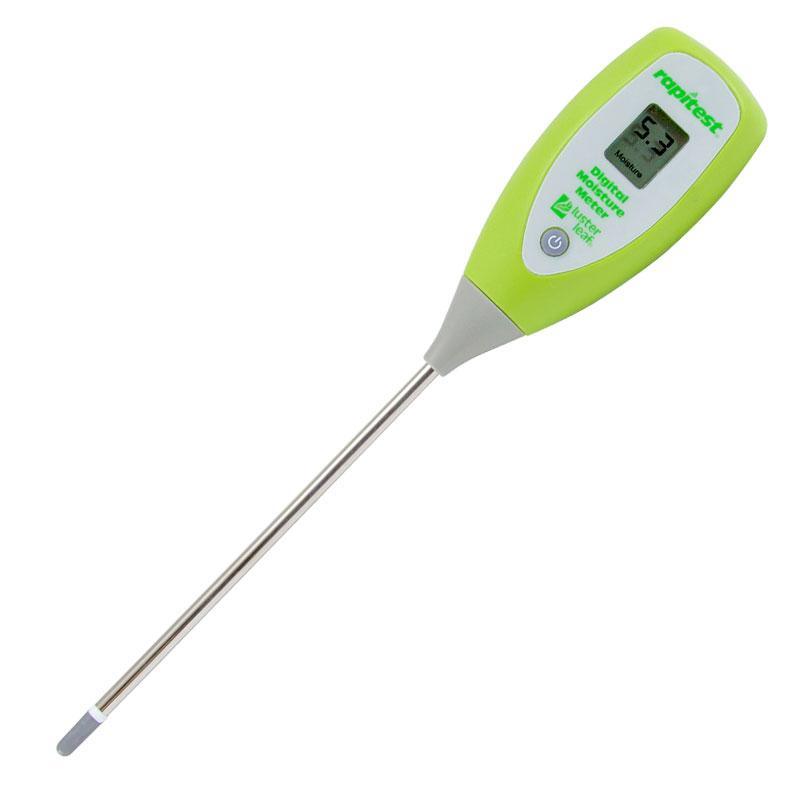The Science Behind Moisture Meters: How They Work and Why They're Important
The Science Behind Moisture Meters: How They Work and Why They're Important
Blog Article
The Ultimate Overview to Wetness Meters: A Comprehensive Summary and Exactly How They Can Conserve You Cash
Dampness meters serve as essential tools in identifying and keeping an eye on moisture material in materials, aiding in avoiding expensive damages and ensuring the top quality of products. Comprehending the subtleties of various types of wetness meters, their applications, and the potential cost-saving advantages they provide can be a game-changer for professionals and organizations alike.
Kinds Of Wetness Meters
Different sorts of moisture meters are readily available for various applications in various sectors. One typical kind is the pin-type dampness meter, which measures the electric resistance in between two pins inserted into a product. This kind appropriates for wood, drywall, and various other structure materials. Pinless moisture meters, on the various other hand, usage electro-magnetic sensor plates to check a larger area without creating damages to the product's surface. Moisture Meter. These meters are perfect for swiftly examining wetness degrees in large areas such as walls and floors.

Furthermore, there are likewise specialized moisture meters made for certain products like hay, grain, or dirt. These meters supply exact moisture analyses customized to the special homes of the material being tested. Infrared dampness meters measure the thermal residential properties of a product to determine its wetness web content non-invasively, making them beneficial for applications where pin or pinless meters may not be ideal. Recognizing the different kinds of moisture meters offered can aid industries select one of the most suitable tool for their details moisture measurement needs.

Advantages of Utilizing Wetness Meters
Wetness meters offer important benefits in precisely analyzing and monitoring dampness degrees in diverse products and environments. One of the primary advantages of using moisture meters is the avoidance of potential damages caused by excess dampness.
Furthermore, making use of wetness meters can lead to enhanced power efficiency. By identifying areas with high dampness levels, such as leakages or poor insulation, modifications can be made to boost power conservation and decrease energy costs. In agricultural setups, moisture meters play an essential duty in enhancing crop returns by enabling farmers to check soil wetness levels and make educated irrigation choices. In general, the advantages of using dampness meters extend across numerous markets, providing economical services and advertising better quality assurance techniques.
Exactly How to Pick the Right Moisture Meter
When selecting a moisture meter, it's important to guarantee that the meter is appropriate for the certain material you will certainly be testing. Various materials have varying electric residential properties that can impact moisture analyses, so selecting a meter created for your material is crucial for accurate outcomes. By very carefully assessing these factors, you can select a moisture meter that fulfills your requirements and offers exact wetness dimensions for your projects.
Correct Techniques for Wetness Meter Use

Cost Savings Through Dampness Meter Applications
How can the strategic use of wetness meters result in significant price savings across numerous sectors? Moisture meters play an essential role in cost financial savings by stopping prospective damage and making sure quality assurance in different fields. In the farming industry, dampness meters help in identifying the optimal time for collecting plants, avoiding over-drying navigate to this website or excess dampness that can affect the last item's top quality. This exact monitoring aids farmers prevent unnecessary losses and optimize their yield.
Similarly, in building and construction, wetness meters aid avoid pricey damages by identifying dampness levels in building materials, such as timber or concrete, which can lead to structural concerns if not attended to immediately. By determining trouble locations at an early stage, professionals can take restorative procedures to stay clear of considerable repair services or substitutes, ultimately saving time and cash.
In addition, in the food handling sector, moisture meters are necessary for monitoring item top quality and guaranteeing conformity with safety and security guidelines. By properly measuring wetness material in food, manufacturers can avoid wasting, keep quality, and minimize waste, causing significant cost savings. Overall, the tactical application of wetness meters is an important investment that can bring about considerable price decreases and boosted performance throughout numerous sectors.
Verdict
Finally, moisture meters are useful tools for gauging and identifying dampness degrees in different products. By making use of the appropriate wetness meter and following proper techniques, users can effectively stop pricey problems brought on by excess wetness. Buying a quality dampness meter can bring about considerable cost financial savings over time by determining prospective issues beforehand and enabling punctual remediation. Inevitably, wetness meters are important tools for maintaining the integrity and long life of frameworks and materials.
Wetness meters serve as essential devices in finding and keeping track of moisture web content in materials, assisting in avoiding expensive damages and making certain the top quality of items. Infrared wetness meters gauge the thermal properties of a material to establish its moisture web content non-invasively, making them beneficial for applications where pin or pinless meters might not be suitable.Moisture meters use very useful advantages in precisely keeping an eye on and analyzing moisture levels in varied products and settings. In agricultural settings, wetness meters play a critical role in enhancing crop returns by making it possible for farmers to why not try these out keep track of soil wetness levels and make informed irrigation choices.In conclusion, wetness meters are important tools for finding and determining moisture levels in various materials.
Report this page